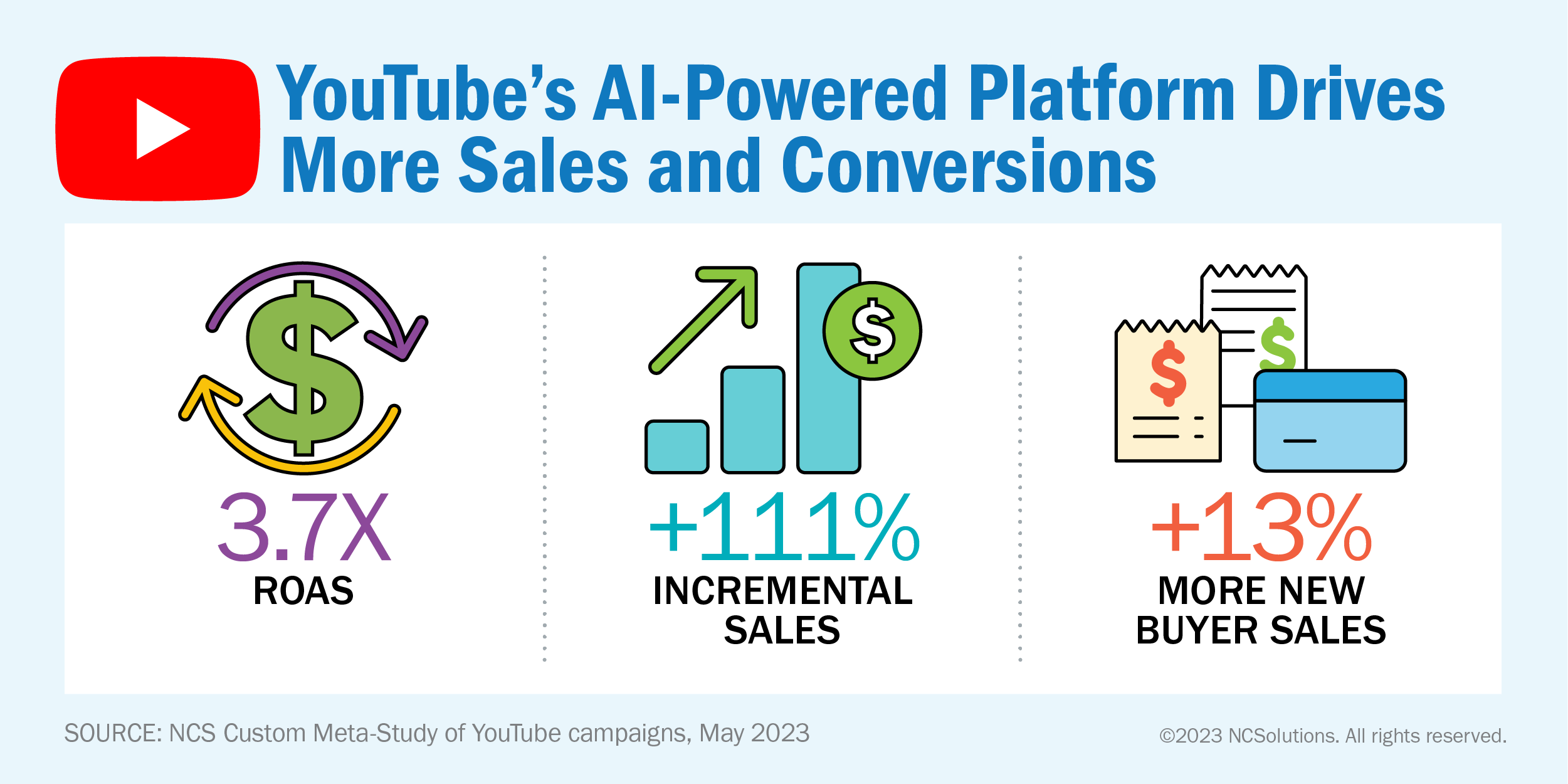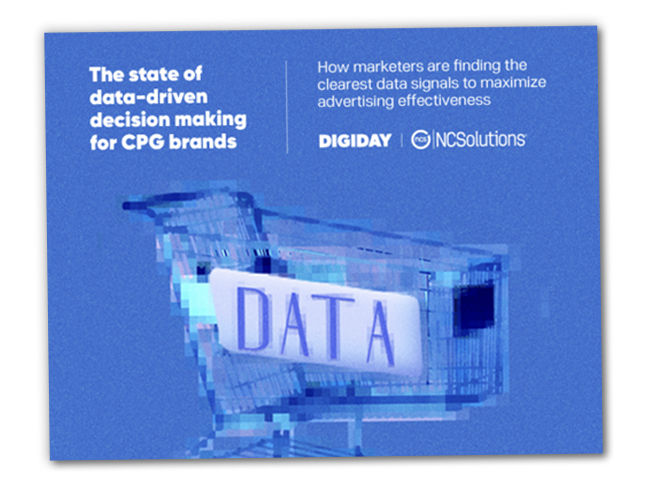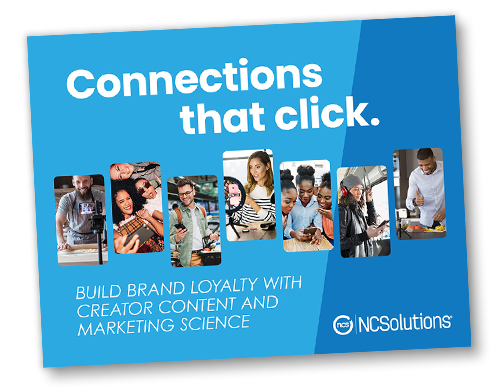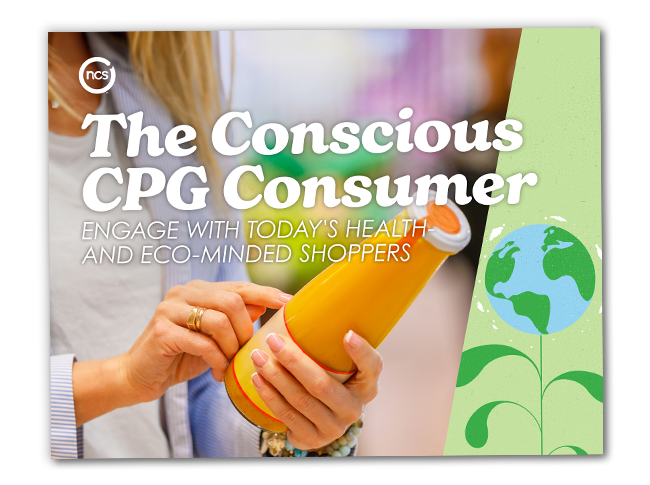Menu
 We partnered with Google’s YouTube to measure theirs
We partnered with Google’s YouTube to measure theirs
By Lisa Kerins, SVP, Publisher Sales and Client Consulting
Artificial intelligence (AI) is working its way into every aspect of advertising. It’s no wonder marketers are under pressure to drive results in the most efficient way, and AI is a versatile and powerful tool. One example: It’s now possible to have AI optimize campaigns.
Google’s YouTube wanted to understand the effectiveness of AI-optimized campaigns compared to manually optimized campaigns, using metrics that advertisers care about the most - like sales lift and return on ad spend (ROAS). They turned to NCS for its precise insights and objective third-party verification of sales outcomes.
We set up a custom meta-analysis to measure and compare the advertising effectiveness of both types of campaigns across the most popular key performance indicators (KPIs) for consumer packaged goods (CPG) marketers. In a survey of brand marketers we commissioned this year, 64% said sales lift is the most significant metric, while 59% said they used ROAS as a yardstick.
Understanding what drives incremental sales is critical. It enables advertisers to be more strategic in their campaigns and to build long-lasting, high-value relationships. And if publishers show them what works and what drives greater efficiency, they’re more likely to win marketers over.
REACHING FOR EFFICIENCY GOALS
This story starts with YouTube’s introduction of video reach campaigns, a new AI-powered campaign option, and - SPOILER ALERT! - ends with NCS helping its partner prove its value by measuring to verify that YouTube’s new AI optimization service does drive incremental sales.
Traditionally, when campaign planning and buying on YouTube, advertisers and agencies must manually optimize their strategies. They’re required to specify both ad formats and the amount of advertising spend that should be allocated to each format. With Video reach campaigns, marketers can instead rely on AI to optimize their campaign plans in real-time.
To understand the advertising effectiveness of this new way of campaign activation, YouTube and NCS partnered on a custom meta-study to analyze sales metrics for an aggregate of YouTube campaigns that included AI-powered Video reach campaign mixes. The team set out to evaluate how this AI-powered solution performed against traditional, manual activations.
AI-POWERED BEATS MANUALLY OPTIMIZED CAMPAIGNS
So, what did our meta-analysis show? Which type of campaign drove more incremental sales, higher ROAS, and extended new buyer reach?
 On all three of these highly ranked metrics, YouTube Video reach campaigns AI-powered mixes stand out.
On all three of these highly ranked metrics, YouTube Video reach campaigns AI-powered mixes stand out.
DOUBLE THE SALES
Sales lift is the top metric for a reason: It proves the value of campaign strategies and helps secure future budgets. That’s why marketers look first to this metric to understand if their campaign strategy is as effective as it can be. Using these insights, brands can adjust the current campaign or make informed decisions about future campaigns.
The results of the NCS custom meta-analysis show that, on average, AI-powered Video reach campaign mixes drove more than double (111%) the incremental sales than manually optimized campaigns.
A STRONGER ROAS
In measuring return on advertising spend, marketers are looking to achieve greater efficiency in their campaigns. The NCS custom meta-analysis proved that when marketers leverage AI to automate optimization, they can drive more efficiency.
Compared to manually optimized campaigns, YouTube’s Video reach campaign mixes earned an average ROAS that was 3.7 times higher.
MORE NEW BUYERS
Advertisers looking to attract new buyers will focus on expanding campaign reach, but optimizing for the right buyers is a crucial step too. YouTube Video reach campaigns proved its value on this metric too. The meta-study showed these campaigns drove 13% higher incremental sales amongst new brand buyers compared to YouTube’s norm.
Using NCS Sales Effect studies, YouTube was able to prove the power of its AI-powered platform. In this NCS custom meta-study of aggregated YouTube campaigns, they’re now able to quantify incremental sales, ROAS, and new buyer response. That’s powerful proof that demonstrates the effectiveness of this approach compared to manual optimization.
In doing so, they’re providing advertisers with a valuable tool that will allow brands to drive better outcomes and improve advertising effectiveness. We’re happy we can help them do this.
So, publishers, if you want to win over advertisers with your AI solutions, present proof that aligns with their highest priority metrics, like incremental sales and ROAS.
Want to know more? Reach out to learn how NCS Meta-Studies can help you prove the value of your platform to CPG advertisers.
Subscribe for Updates
GET INSIDE THE MINDS OF CPG BRAND MARKETERS
Learn about their data-fueled strategies
SNAG YOUR COPY OF THE REPORT TODAY
WONDERING HOW CONSUMERS RESPOND TO INFLUENCER MARKETING?
See how creating content drives results
DOWNLOAD YOUR COPY NOW
WANT TO KNOW MORE ABOUT HEALTH AND ECO-MINDED SHOPPERS?
Get CPG insights to engage your buyers
ACCESS THE E-BOOK TODAY


.png)
.png)

